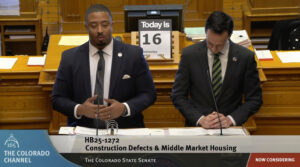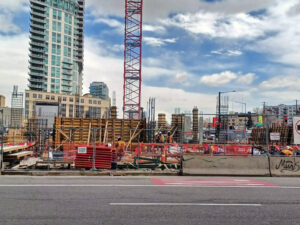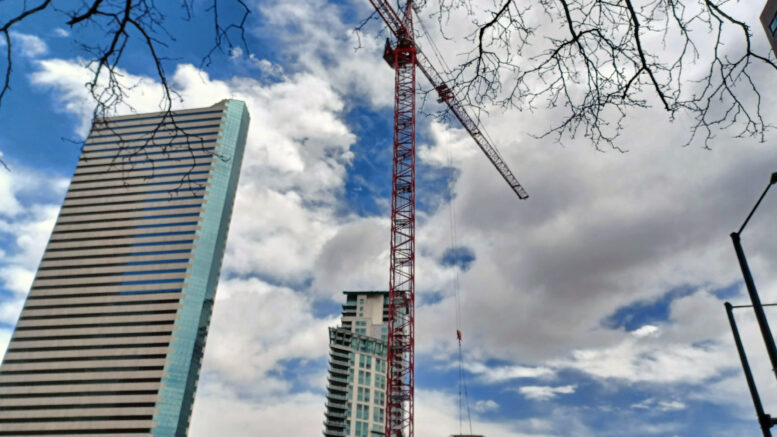Even as legislators are advancing construction-defects reform, a subset of construction professionals point to another bill moving quietly through the Legislature and argue it could counter the positive impacts of the reform bill and slow construction of affordable housing.
Supporters of Senate Bill 185 — an odd coalition that includes homebuilders and the attorneys who represent homeowners in defects lawsuits — disagree, saying the bipartisan proposal is about ensuring all professionals are held accountable for negligence. The bill would declare that a 2023 Colorado Court of Appeals case on this topic does not stand as case law, but proponents and opponents disagreed significantly beyond that on what the full impact of the measure would be.
This latest battle, which played out over the course of a three-hour hearing before the House Judiciary Committee on Tuesday, comes as legislators are ramping up efforts to generate affordable owner-occupied housing while the cost of living continues to climb. Their focus through House Bill 1272 is restarting a condominium market that’s fallen from 20% of new home inventory to 3% — a goal the legislation hopes to accomplish by making it harder for warranty-offering condo builders to be the targets of construction-defects suits.
HB 1272 passed the Senate by a 31-4 margin on Thursday, and the House concurred with Senate amendments on Wednesday morning to send the bill to Gov. Jared Polis, who has vowed to sign it. On April 16, sponsors added amendments to better define the kinds of defects that can still lead to lawsuits, but builders continue to fear that the changes in the bill won’t be enough to curb suits and bring down sky-high insurance costs that keep potential builders out of the market.
Differences between the two bills

Colorado state Sens. James Coleman and Dylan Roberts discuss their construction-defects reform bill in the Senate.
While HB 1272 seeks to reduce the frequency and magnitude of lawsuits against builders, SB 185, sponsored by Democratic Senate Majority Leader Robert Rodriguez of Denver and Republican Sen. Byron Pelton of Sterling, would give plaintiffs more pathways to relief. It would do so by clarifying construction professionals owe an independent tort duty of care to construct residences in a non-defective and reasonable manner and that this duty is owed equally to original and subsequent purchasers of a home.
State law has held that buyers of new homes can sue general contractors for defects but that later buyers of homes can file tort claims against specific construction professionals, like architects or engineers, who are responsible for defects, attorney Heidi Storz said. However, in cases where general contractors may shut down or go bankrupt, homeowners can be left without relief options — and SB 185 would allow them to go those specific subcontractors if they are the cause of problems.
“I think that this is a very important bill for as a body to say what kind of public policy we expect to see in the state,” said Rep. Yara Zokaie, a Fort Collins Democrat who joined with fellow progressives and with conservative Republicans to advance SB 185 on a 7-4 vote. “I think that negligence is something that everybody should be on the hook for.”
Could new bill encourage more construction-defects lawsuits?
The reason that engineers and architects see the change as so troubling is because both groups of professionals now sign contracts with builders that limit their liability in the case of lawsuits to a certain amount of dollars. SB 185 would toss out decades of contract law and allow original homebuyers to sue them for amounts well beyond the contracted liability, argued Dan Woodward, an attorney who represents design professionals.
Just as existing tort law is so permissive that it’s led to a profusion of construction-defects lawsuits and frozen that market, critics say — and created the need to pass HB 1272 — SB 185 could scare engineers and architects away from working on homes, opponents said. Risk-averse firms would work on less litigious commercial projects, while more risk-taking firms could set up limited liability companies for each home project, limiting their exposure to lawsuits but raising prices and creating a shortage of homebuilding subcontractors.
“Engineers are already liable under the current system. If we make a mistake, we are held liable through our contracts. This bill undermines those contracts,” said Brant Lahnert, principal engineer and CFO at Golden-based KL&A Inc. “If Senate Bill 185 passes, the unknown risk will force companies like mine, known for their quality, out of the market.”
That argument in turn led to further debate about whether SB 185 would negate the benefits of HB 1272.

A construction crew works in downtown Denver
A question of risk
Rep. Chad Clifford, who joined with a pair of moderate Democrats and one Republican to oppose SB 185, said he’s spent years trying to figure out how to reduce defects lawsuits only to find a bill like this that will allow more of them to move forward, potentially leaving the condo market in neutral. Woodward, meanwhile, said this could scare subcontractors off the lower-paying residential projects where they need to keep prices down in order to ensure housing is affordable, once again limiting construction of attainable housing.
“We’re trying to incentivize risk-averse, skilled design firms to get involved in these jobs. And in order to do that, they have to have the confidence their liability will be limited,” Woodward said. “Senate Bill 185 doesn’t allow that.”
But David McLain, a construction attorney who defends builders, sought to refute that notion by arguing that deeper-pocketed general contractors will remain prime litigation targets and that homeowners will go after design professionals only in limited instances. There’s no interplay between HB 1272 and SB 185, he said, because 1272 offers ways to resolve construction disputes without going to court and 185, rather than encouraging lawsuits, acknowledges that specific professionals can be targets of negligence complaints in addition to contractors.
“Each construction professional should be responsible for the damage their negligence caused,” McClain told the committee while testifying for the bill.
SB 185, which passed the Senate on a 23-11 vote last month, heads now to the full House for debate. The 2025 legislative session must wrap up by May 7 at the latest.
